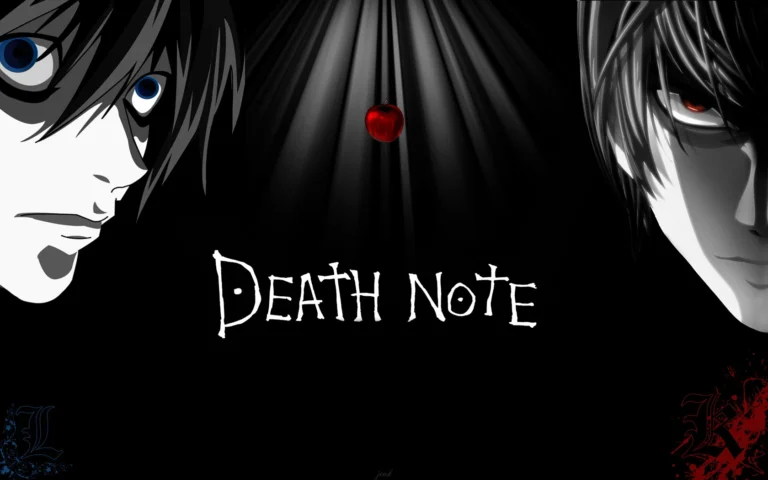“The Human Whose Name is Written in This Note Shall Die.”
A simple sentence, yet one that chills to the bone, is the very crux of Death Note, one of the most iconic and morally ambiguous anime masterpieces of all time. Crafted by writer Tsugumi Ohba and artist Takeshi Obata, Death Note stands tall as a tale of power, intellect, and the intoxicating nature of godlike control. In its pages and frames, it invites viewers to question not only their moral compass but also society’s tenuous definition of justice.
The anime takes us deep into the psyche of Light Yagami, a high school prodigy who stumbles upon the Death Note—a supernatural notebook dropped by Ryuk, a Shinigami (death god) from the unseen realms of death and darkness. The power it grants Light is deceptively simple: if you write someone’s name in the Death Note, while visualizing their face, that person will die. This premise sets the stage for an intellectual and philosophical showdown between Light, who seeks to play God and cleanse the world of crime, and L, the eccentric detective who pursues him.
What makes Death Note remarkable is not its premise alone, but its delicate treatment of human nature. Like Tsugumi Ohba’s storytelling style, it moves in precise, deliberate beats—each decision, each twist, reverberating far beyond the pages or screens.
The Nuances of Death Note
Light Yagami: Savior or Tyrant?
Light Yagami is one of anime’s most fascinating protagonists, though “protagonist” may itself feel like a misnomer. He is complex, charismatic, and cold. When he first discovers the Death Note, Light declares his intent to rid the world of evil. His ideals are lofty—a utopia without crime, where he reigns as God—yet his actions reflect a darker hunger for control, power, and immortality through legacy.
What makes Light compelling is how unrelenting he is in his convictions. Ohba captures the essence of a Faustian bargain here—Light’s initial good intentions twist and spiral into unrecognizable ambition. His decline is deliberate, as his purity of purpose decays into arrogance. A striking moment in the series occurs when Light declares, “This world is rotten, and those who are making it rot deserve to die.” Here, the audience is forced to pause—how much of Light’s sentiment do we agree with? And where do we draw the line between justice and vigilantism?
Light’s brilliance is juxtaposed against his moral erosion. He is no mere villain—he is a tragic anti-hero consumed by his own god complex, a dark mirror of the human desire for influence.
L: The Moral Counterpoint
The second pillar of Death Note’s brilliance lies in the character of L, the eccentric and elusive detective whose intellect rivals Light’s. With his disheveled hair, hunched posture, and compulsive candy consumption, L is as unconventional a hero as Light is an atypical villain.
L Is the ultimate counterbalance—where Light represents the descent into moral compromise, L is an almost idealized figure of reason, one who relies on logic and deduction. His pursuit of Light, or “Kira,” is relentless and cerebral, transforming the anime into a high-stakes chess game.
L, however, is no saint either. While he embodies justice, his methods are ambiguous—wiretapping, coercion, and manipulation are tools he wields unapologetically. Yet, in stark contrast to Light’s thirst for godlike authority, L remains grounded in his humanity. His death is one of the most poignant moments in the series, signaling the temporary triumph of power over morality.
The dynamic between Light and L forms the core tension of the series. It is intellectual warfare at its finest—two brilliant minds clashing not with weapons, but with wits. Ohba’s writing ensures that the audience roots for both of them, even as their motives diverge.
The Symbolism of the Shinigami
A significant layer of Death Note lies in its use of Shinigami—Japanese gods of death. Ryuk, the Shinigami who drops the Death Note into the human world, is both a guide and a silent observer. Unlike Light, Ryuk is apathetic toward human life and morality; he is driven solely by boredom. This detachment makes Ryuk a fascinating character.
In Japanese folklore, Shinigami are entities that escort souls to the afterlife, much like the Grim Reaper in Western mythology. They are neither wholly evil nor benevolent—they simply exist. The folklore’s ambivalence reflects Ryuk’s role as well: he neither condemns nor supports Light’s actions. Instead, he watches, entertained by the chaos.
The concept of Shinigami as neutral arbiters is particularly poignant in Death Note. It underscores the idea that death itself is not moral or immoral—it simply is. Light’s actions are not dictated by fate, nor are they guided by divine approval. Ryuk’s parting words to Light—*“Humans are so interesting”—*are a chilling reminder of how easily the line between hero and villain blurs in the pursuit of power.
Death Note and Japanese Folklore
The influence of Japanese folklore doesn’t stop at the Shinigami. The themes of death, fate, and morality are deeply entrenched in Japan’s cultural narratives. Many traditional tales involve humans receiving supernatural powers or interacting with spirits, only to face inevitable consequences.
For instance, The Tale of the Bamboo Cutter (Kaguya-hime) features divine beings who remain detached from human affairs, much like the Shinigami. Similarly, many yōkai (supernatural creatures) stories involve a mortal using a cursed object, leading to unintended destruction—a direct parallel to Light and the Death Note.
By embedding these folkloric elements into a modern, urban setting, Death Note creates a unique fusion of ancient myth and contemporary anxieties.
The Power of Choice and Consequence
One of Death Note’s strongest themes is the relationship between choice and consequence. Light’s descent into darkness is entirely his own doing. The Death Note itself is merely a tool—it does not corrupt him; it amplifies what already exists within him. This idea mirrors real-world moral dilemmas: Does power inherently corrupt, or does it simply reveal true nature?
Ohba structures the narrative so that every action leads to inevitable consequence. Light’s every triumph pushes him closer to his fall, and his final moments—isolated, desperate, and utterly defeated—are a testament to the hubris of playing god. In the end, it is not justice that brings Light down but his own arrogance.
More From Author: Ultimate Guide to Roblox
Why Death Note Endures
Even years after its release, Death Note remains one of anime’s most compelling works. Its exploration of power, morality, and justice continues to resonate with audiences worldwide. Unlike many anime that lean on fantastical escapism, Death Note forces viewers to confront uncomfortable questions about human nature:
If given the power to kill without consequence, would you use it?
Can absolute power ever be used for absolute good?
What separates justice from revenge?
Ohba and Obata’s collaboration ensures that Death Note never preaches. Instead, it poses these questions with ruthless precision, allowing viewers to grapple with the answers.
“I’m Simply Here to Observe.”
Death Note is more than an anime; it is an experience. It is a dark, cerebral journey into the depths of human ambition and morality, punctuated by breathtaking twists and philosophical undertones. Its nuanced characters, from Light’s godlike ambitions to L’s unwavering pursuit of justice, elevate it beyond mere entertainment.
At its core, Death Note is a cautionary tale. It reminds us that power, no matter how righteous its intentions, can consume and destroy. It challenges us to look within and confront our own boundaries of morality.
And as Ryuk might say, perhaps that’s what makes humans so interesting.



